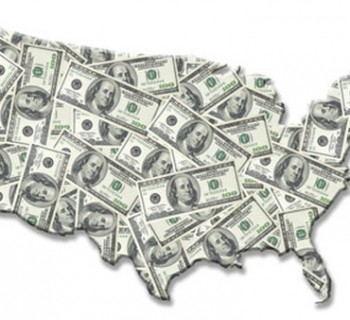 The fiscal cliff is right around the corner. The combination of tax increases and spending cuts which are currently scheduled to occur at the beginning of 2013 could have a major impact on the market unless politicians take action.
The fiscal cliff is right around the corner. The combination of tax increases and spending cuts which are currently scheduled to occur at the beginning of 2013 could have a major impact on the market unless politicians take action.
Just how significant is it? The Congressional Budget Office estimates that our gross domestic product will contract during the first half of 2013 as a result of these policies. In fact, many economists estimate the net drag on the economy could be as high as 5 percent of GDP — significant enough to pull us back into recession.
What exactly is scheduled to occur at the end of 2012 if politicians do not act? First, $103 billion per year of spending cuts were negotiated during the debt-ceiling debate will go into effect. Next, Social Security withholding taxes that were temporarily reduced will rise from 4.2 percent back to 6.2 percent. Next, in order to help fund the healthcare reform which was passed in 2009, families whose income is above $250,000 will have to pay an additional 3.8 percent on taxable investment income.
Finally, tax provisions are set to expire that will increase the tax rate on ordinary income, capital gains, dividends and estate taxes for some taxpayers. In total, $500 billion could be removed from the economy in 2013 alone.
Although policy changes could be made after the upcoming election by a “lame duck” congress, many analysts believe that pressure to reduce our ever-growing deficit will lead to higher tax rates at some point in the future. As a result, investors may want to consider the following investment strategies for a rising tax environment, and since each investor’s situation is unique, consider consulting with your tax adviser to ensure that a strategy is right for you.
It may be a good time to sell certain assets to take advantage of the lower capital gains rate. From selling a business or an investment property to trimming back a concentrated stock position or rebalancing your portfolio, locking in the lower long-term capital gains rate of 15 percent may be wise. With the top capital gains rate expected to increase to 23.8 percent, investors who were considering a sale may want to take advantage before year end.
Next, investors with a higher marginal tax rate may want to consider utilizing municipal bonds for non-qualified accounts.
The interest payments from municipal bonds are federally tax-exempt while state and other local taxes may apply depending on the bond. If you are in the 33 percent tax bracket, the tax-equivalent yield on a 3 percent municipal bond is actually 4.49 percent. As your marginal tax rate increases, the advantages of these bonds become more pronounced. With the top ordinary income rate rising to 43.8 percent, increased demand from investors looking to municipal bonds for shelter from larger tax bills could drive prices higher.
Remember, municipal bonds are subject to market and interest rate risk and values may decline if interest rates increase, so do your due diligence when selecting bonds.
If you are considering a Roth conversion at some point in the near future, now may be the time to get started. Converting your traditional IRA to a Roth IRA means that you will realize taxable income this year on the value of the account in exchange for the benefit of withdrawing from your account tax-free at retirement.
Investors who expect to be in the same or higher tax bracket during retirement should determine if a Roth conversion makes financial sense. If ordinary tax rates move higher, a Roth conversion may be even more advantageous.
Next, Deferring tax deductions until next year may also be wise for some taxpayers. The tax benefit from any deduction rises as your tax rate increases, so deductible expenditures may be a larger benefit if you expect to be facing a higher ordinary income tax rate next year.
Finally, investors may want to examine the tax efficiency of their investments and strategies as we head into 2013.
Investment approaches that include a higher frequency of adjustments or “turnover” may be less desirable, since they could subject you to a larger tax bite.
However, investors need to examine overall net performance, because taxes are only one of many variables that should be considered when making investment choices.
While the tax and spending adjustments for 2013 are currently on autopilot and scheduled to occur, politicians could choose to change course on many of the issues including taxes.
Investors should keep a close eye as the “rules of the game” change to ensure that they are best positioned for the upcoming tax environment.
Kurt J. Rossi, MBA, is a Certified Financial Planner Practitioner. He can be reached for questions at 732-280-7550 or kurt.rossi@Independentwm.com. LPL Financial Member FINRA/SIPC.








